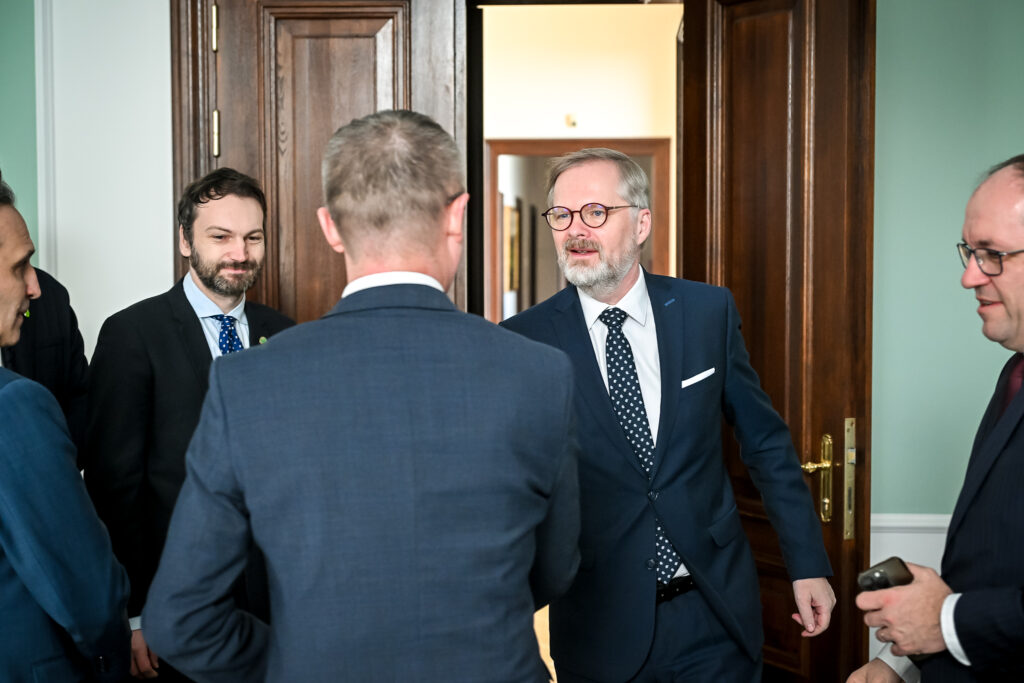Prime Minister Petr Fiala, together with Minister of Agriculture Mark Výborný and the Chair of the European Parliament's Agriculture Committee Veronika Vrecionová, held talks with representatives of agricultural organisations and other sectors on current issues, cutting red tape for farmers and food producers. During the meeting, all participants agreed to support deregulation across the EU to maintain competitiveness. Agricultural and food NGOs representing the vast majority of Czech farmers and food processors have today united and launched a joint initiative to ensure the long-term stability, competitiveness and sustainability of Czech agriculture.
Czech agriculture is at a crossroads. Instead of a clear strategy to enable farmers to prosper and ensure the long-term sustainability of food production, the sector is faced with a chaotic state approach, increasing administrative burdens and extremely strict regulations. Our farmers face the most stringent soil erosion protection in Europe, increasing restrictions on livestock production and the rising costs of compliance with sustainability rules - all without adequate compensation. The result is an increasingly uncompetitive domestic production, a decline in investment and the gradual resignation of many farmers to actual production.
The consequences of this policy are alarming. The Czech Republic is increasingly dependent on imports of basic foodstuffs, while agrarian foreign trade is sinking into a record deficit of CZK 45 billion. Other EU Member States are responding to this development by actively supporting their own farmers and seeking ways to protect domestic production. The Czech government is taking the opposite approach - instead of strengthening production farms, it is taking steps that weaken their position. In order to reverse this destructive trend, agricultural and food organisations have prepared a plan of concrete measures to restore Czech agriculture to its role as a strategic sector and enable farmers to prosper without depending on subsidies.
"This plan is the result of a broad consensus across the agriculture and food sector. We want a clear policy change that will support production agriculture, reduce the administrative burden and set the conditions so that the Czech farmer can do business competitively," He told Jan Doležal, President of the Agrarian Chamber of the Czech Republic.
Key problems and proposed solutions
* Promoting production agriculture and reducing dependence on subsidies
Support must focus on farmers who actually produce food, not those who are primarily focused on drawing subsidies. The current subsidy policy is inefficient, unacceptably expensive for the taxpayer and completely demotivating for farmers.
"Active farmers today have to fight for survival in a system that encourages unproductive farming. But without strong farmers and processors, the country's food self-sufficiency will sink even deeper. We call for direct support for food production and a level playing field in the market," He told Martin Pýcha, Chairman of the Agricultural Union of the Czech Republic.
* Introduction of mirror measures for imports
Current EU trade policy is based on the free market, but it does not take into account that Czech and European farmers are bound by strict environmental, welfare and administrative rules that do not apply to imported food.
"If the state does not protect domestic producers from unfair competition from third countries, then no wonder our agriculture is declining. We demand that imported food meet the same standards as our own - otherwise we are destroying our own production," He stressed Frantisek Winter, Chairman of the Czech-Moravian Union of Agricultural Entrepreneurs.

* Common Agricultural Policy (CAP) reform
The CAP must ensure a decent income for farmers, as foreseen in Article 39 of the Treaty on the Functioning of the EU. This means, in particular, setting conditions that allow farmers to be competitive on the market.
* Reducing bureaucratic burden and ESG reporting
Administrative requirements for farmers have been increasing for a long time, and the newly introduced ESG reporting, i.e. regular reporting of carbon emissions in the framework of the so-called non-financial reporting, will add an unbearable burden.
"Instead of focusing on the economy, we have to fill out endless forms and reports. We demand a radical reduction in bureaucracy and a reduction in mandatory ESG reporting, which has no added value," He stated Martin Šebestyán, Chairman of the Agri-Food Business Initiative.
* Ensuring investment in the modernisation of the sector and food processing
The lack of modern processing capacity means that Czech agriculture is increasingly dependent on the export of raw materials and imports of finished foodstuffs.
"We need investment in processing so that we don't have to export cheap raw materials and import finished products. This is the only way to ensure greater self-sufficiency and added value for Czech consumers and entrepreneurs. The state should also target food imports from third countries that do not meet our strict standards - whether it is pesticides or antibiotics and growth hormones, which are banned in the EU," She told Dana Večeřová, President of the Food Chamber of the Czech Republic.
"European policy must return to its original mission - to ensure stable production of quality food. It is not possible for Czech farmers to stop farming because of political experiments and be replaced by cheap imports," He told David Brož, President of the Society of Young Agrarians of the Czech Republic.

Real Solutions Plan
Today's meeting with Prime Minister Fiala is a crucial opportunity to push for real change. Agricultural and food organisations expect the government to finally listen to arguments and adopt measures that will strengthen domestic production and protect Czech farmers.
"Czech agriculture is at a crossroads. Either we decide on a strategy that will lead us to food security and strong competitiveness, or we will continue to be a passive victim of bureaucratic rules and the global market," concluded Jan Doležal.
Possible steps to improve Czech agriculture and food sector
- Promoting higher value-added production:
- Investments in technologies for processing raw materials directly in the Czech Republic corresponding to the size of the Czech and European market.
- Focus on the production of products with higher added value (dairy products, cold cuts, canned foods, fruit and vegetables).
- Change in subsidy policy:
- Optimising subsidies to incentivise production, not just maintaining inactivity.
- Supporting young farmers, young workers and modernising businesses.
- Promoting diversification and sustainability:
- Investing in increasing the share of livestock production, promoting soil-improving crops, promoting horticulture and fruit growing.
- Increasing resilience to climate change, including new breeding methods, upgrading irrigation systems and insuring risks.
- Diversification in the field of renewable sources (biogas stations, biomethane, biomass, PV on the roofs of agricultural buildings).
- Improving your negotiating position:
- Strengthening farmers' organisations to better negotiate with commercial chains, including by removing any administrative obligations not required by overarching EU legislation.
- Promoting shorter supply chains and simplifying the marketing of products.
- Infrastructure and education:
- Creation of modern processing plants, storage capacity and improved transport infrastructure.
- Support for research and innovation in the agri-food sector.
- Greater links between secondary and higher agricultural schools and practice in the form of scholarships and long-term cooperation.
AK ČR/ gnews.cz - RoZ
PHOTO - Office of the Government of the Czech Republic



